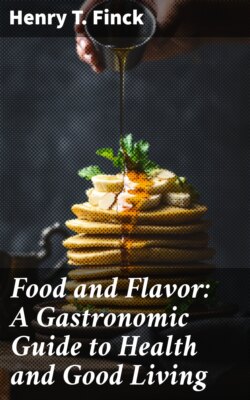Читать книгу Food and Flavor: A Gastronomic Guide to Health and Good Living - Henry T. Finck - Страница 23
На сайте Литреса книга снята с продажи.
HOW FLAVOR HELPS THE STOMACH.
ОглавлениеTable of Contents
In all cases, be the food simple or the outcome of a French chef's culinary alchemy, it is its Flavor that makes it agreeable and by so doing stimulates the flow of the juices necessary for proper digestion.
In the case of the mouth and its salivary glands this is obvious to all. Everybody knows that the fragrance of good food "makes the mouth water."
In the case of the stomach, the connection is much less obvious. Until a few years ago even the medical men were in the dark on this extremely important aspect of the question, although French and German physiologists had made important discoveries.
A French chef's culinary alchemy
It remained for Professor Pawlow of St. Petersburg to throw the bright light of scientific experiment on this subject.
He demonstrated in his St. Petersburg laboratory that the mere presence of food in a dog's stomach—which is like a man's in that respect—does not suffice to cause a flow of gastric juice, but that the psychic factor we call appetite—a keen desire for food—causes an abundant flow of that fluid, without which the digestion cannot proceed.
Now it might be said that there was really no need of laboratory experiments to tell us that food eaten without enjoyment lies like lead in the stomach and does more harm than good.
It is nevertheless a great advantage to have a scientific demonstration of the fact and an explanation of it, because it encourages us in the right way of eating.
Instinct showed that way long ago; it did its best to intimate that food should be eaten with interest and enjoyment.
Too often, unfortunately, no attention has been paid to this instinct. Among the Russians (who do not, in this respect, differ from other peoples) "an absolutely unphysiological indifference towards eating often exists," Professor Pawlow says. "In wider circles of the community a due conception of the importance of eating should be disseminated. How often do the people who have charge of the commissariat pay attention solely to the nutritive value of the food, or place a higher value on everything else than taste!"
Yet it is the "taste" (Flavor) of food that arouses the appetite. As the French say, "the appetite comes while we are eating." Medical men of various countries in former times paid special attention to the restoration of a patient's appetite. In more recent text books less attention is paid to appetite as a symptom; but Prof. Pawlow's experiments have again, and for all time, demonstrated its importance.
Those young ladies who think it is "nice" and "feminine" to pretend to have no appetite should read the Pawlow papers, and have all that nonsense knocked out of their heads. A poor appetite is a danger signal—a thing to arouse pity and to be cured, just like a headache or a fever.
"Appetite juice" is one of the suggestive names Professor Pawlow gives to the fluid which digests food in the stomach. There is little or none of it for the man who eats without noticing his food, unable to distract his thoughts from his work, as so often happens to those who live in the midst of the incessant turmoil of large cities. This inattention to the act of eating (to the Flavor of the food) prepares the way for digestive disturbances with all the various diseases following them. No medical treatment can help such a patient—unless he reforms and eats rationally.
Thus, the studies of Dr. Pawlow fully bear out my contention as to the Vital Importance of Flavor in Food.
An American quick-lunch
There is one more of his observations to which superlative importance attaches. One of his experiments on dogs showed that if food was given gradually in small quantities, it led to the secretion of much stronger gastric juice than when the animal was allowed to eat the whole ration at once.
This was a laboratory demonstration of the wisdom of the best medical treatment of a weak stomach; "and such a regulation of diet," continues the professor, "is all the more necessary, since, in the commonest disorders of the stomach, only the surface layers of the mucous membrane are affected. It may, consequently, happen that the sensory surface of the stomach, which should take up the stimulus of the chemical excitant, is not able to fulfil its duty, and the period of chemical secretion, which ordinarily lasts for a long time, is for the most part disturbed, or even wholly absent. A strong psychic excitation, a keen feeling of appetite, may evoke the secretory impulse in the central nervous system and send it unhindered to the glands which lie in the deeper as yet unaffected layers of mucous membrane."
Doubtless the very interesting physiological detail here pointed out by the eminent Russian professor, explains the dietetic as well as gastronomic wisdom of the old fashioned table d'hôte of the European hotels. Half a dozen or more courses follow one another leisurely in course of an hour or more during which the pleasant Flavor of one dish after another keeps the appetite on edge and gives plenty of time for the deeper as well as the surface layers of the glands to secrete their beneficent and comforting digestive juices.
From such a leisurely dinner, with courses skilfully made up of contrasting flavors to prevent the appetite from flagging, we rise cheerful and at peace with all the world, whereas an American quick-lunch, or a railroad dinner gulped down in ten minutes makes us feel like swearing off eating for all time.
